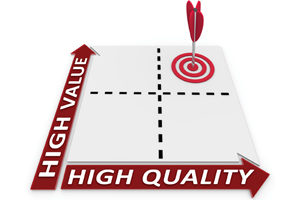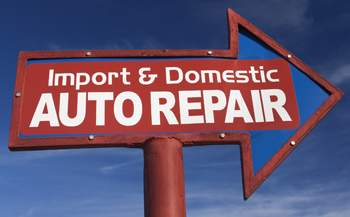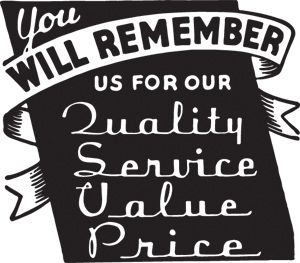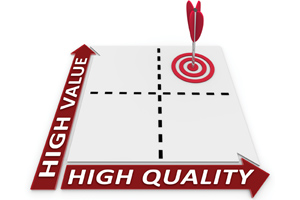By Bob Cooper
President, Elite Worldwide, Inc.
There’s no doubt that pricing is one of the most misunderstood elements of business. There’s not only a lot of bad information out there, but with these tough economic times, there’s a lot of uncertainty, as well.
So, what I decided to do with this article is break the subject of pricing down into three components: Base pricing, price modification and measuring results.

Base Pricing
At Elite, we believe that in all cases, your prices need to be competitive. By “competitive,” I’m not suggesting that you need to charge the same price as the shop down the street. What I am saying is that your prices need to be competitive with other service providers that deliver a level and quality of service that is comparable to yours. So take the pulse of your community to discover what other well-run shops and dealerships are charging for the more popular services and repairs.
If you’re not competitive, you’ll have a short-lived career, so don’t develop a false sense of security by telling yourself that your shop is far better than your legitimate competitor’s. Remember, in the world of business, with all due respect, your opinion doesn’t count. Your customers’ perception of value is the only thing that really matters. And, for them, perception is reality.
Price Modification
Once you’ve concluded what your base pricing needs to be to ensure you’re competitive, you’ll have to run the numbers. When you do the math, you should be able to quickly determine if you can operate a profitable business (at your predetermined pricing structure) based on your fixed expenses, the required return on investment, your cost of goods and your shop’s potential. You should easily be able to determine the number of employees you’ll need, and the number of vehicles you’ll need to process, in order to reach your financial goals.

One option you can explore after running the numbers is to find ways to provide added value to your services that will allow you to increase your pricing. Bear in mind that your customers’ perception of added value will need to be easily recognized, and it will need to be cost justifiable, so consider added-value items like longer warranties, premium parts and complimentary loaner cars.
The other point you need to consider with price modification is how often you should raise your prices. Some management companies suggest that you should systematically raise your prices every quarter, but at Elite we strongly disagree. It makes little sense to say we should automatically raise our prices just because we can.
What I would encourage you to do is review your pricing once a quarter. If there are no negative changes in your economy, and no changes in your competition, you may then want to consider raising your prices.
If you do, the increases should be small, unless you are correcting a major deficiency. Not only are small increases more easily acceptable in the eyes of your customers, but you will find that your service advisors will feel far more comfortable with small increases, as well. Bear in mind that any time your service advisors have a hard time buying into a price increase, they’ll have a hard time selling it.
You also may want to consider loading the majority of your increases in your labor charges, rather than your parts pricing, and here’s why. In the customer’s mind, parts are parts, but labor charges are far easier to defend because your technicians may be more skilled than the techs down the street. If you spoke to two doctors about a surgery, you would more than likely expect the price of the anesthesia to be about the same with both doctors. But, if the one doctor charged more for professional services than the other, you may very well feel it’s worth it, because he or she could conceivably be a better physician. It’s no different in your business. To the consumer, parts are parts, yet the technical expertise between two techs will never be the same.
Another good rule of thumb is to avoid falling prey to other shop owners telling you that they jacked up their prices and haven’t lost any sales at the point of sale. These are typically the same shop owners, who, a year later, find that their customers have all but disappeared.
The reality is that just because your customers authorize a service, it doesn’t mean they were “sold” on the job. Oftentimes, they’ll approve the service (at a price they feel is too high) just to get the repair behind them, and then they’ll never come back.

Measuring Results
In all cases, I would strongly encourage you to monitor the “consumer acceptance” of your pricing. First, you need to pay close attention to the sales that are lost at the point of sale and track each one.
Second, you should do your follow-up calls, and monitor how many of those customers ultimately return.
The last component you will need to monitor is your number of referral customers, both in actual count and as a percentage of your total leads.
There’s no question that if your customers continue to return, and continue to tell their friends about you, your prices are considered acceptable.
In closing, far too many shop owners have this ill-founded belief that their services are worth more than they really are. They jack up their prices, they make a lot of money for a few months, and then their customers disappear.
Don’t let this happen to you. Instead, you should do what all the well-run, ethical shops do. You should deliver great value to everyone who comes into your shop; you should never put money ahead of people; and, if you do decide that it’s time to raise your prices, just be sure to do it carefully. And, in a manner that will not adversely affect those priceless relationships that you have with the single most important part of your business: Your customers.
For the last 20 years, Bob Cooper has been the president of Elite Worldwide, Inc. (www.EliteWorldwideStore.com), offering shop owners sales, marketing and employee management audio training courses available for instant download. The company also offers coaching and service advisor training services. You can contact Bob at [email protected], or by calling 800-204-3548.














